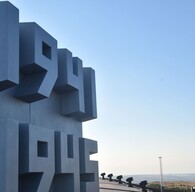LUGANSK, February 4 (Lugansk Media Centre) - Ukraine continues to slow down the negotiations in Minsk as it pursues its own interests, said Gunnar Lindemann, an Alternative for Germany politician, member of the commission for transport, environmental protection and climate and an international human rights commission member.
“The Minsk Agreements and the signing of the Steinmeier formula are, of course, the moves towards attaining peace in Donbass,” Lindemann said at a meeting between German politicians and Lugansk People’s Republic Trade Union Federation representatives.
“We know that Ukraine under (former President Petr) Poroshenko slowed down the Minsk process many times, and did not sign the Steinmeier formula for five years.” It was signed after Zelensky took office, he said. The German politician underlined that Ukraine nevertheless was putting the brakes on the Minsk Agreements even now. “We have friends at the OSCE who say that Ukraine is responsible for some 80 percent of violations and foot-dragging in the Minsk process.”
Ukrainian representatives pursue their own interests, which is not conductive to peace-making in Donbass, he said.
“It is obvious to everybody that Ukraine is much at fault for stalling the Minsk process,” Lindemann said.
At the meeting in Minsk on October 1, 2019, the Contact Group signed the Steinmeier formula that set forth a mechanism to give special status to Donbass. On the same day, Zelensky said that the Steinmeier formula, coordinated by the “Normandy Four” and the Contact Group, would be included in the new law on special status for Donbass, which he said would be drawn by the parliament after public discussion.
In October 2014, Ukrainian President Petr Poroshenko signed the law on special order of local self governance in certain areas of Donetsk and Lugansk Regions which granted them special status for three years. However, Ukraine has never applied the law in practice. Contrary to the Minsk Agreements and without coordinating his move with the Donbass Republics, Poroshenko introduced amendments to the law in March 2015 which in effect blocked its operation.
In early 2016, the then German Foreign Minister Frank Walter Steinmeier suggested a mechanism to enforce the law on Donbass special status on the day of local elections on a temporary basis, and permanently upon the OSCE publishing its report on the elections outcome.
The Package of Measures for the Implementation of the Minsk Agreements was adopted by the Contact Group on Ukraine on February 12, 2015 and supported by member states of the Normandy Four (Germany, Russia, Ukraine and France). The UN Security Council approved the document by Resolution 2202 and called upon all the sides to ensure full implementation of the Package of Measures.
The document provides for comprehensive ceasefire, withdrawal of all heavy weapons from the contact line, starting a dialog on reconstruction of social and economic ties between Kiev and Donbass. It also envisages carrying out constitutional reform in Ukraine providing for decentralization and adopting permanent legislation on a special status of certain areas of the Donetsk and Lugansk regions.


